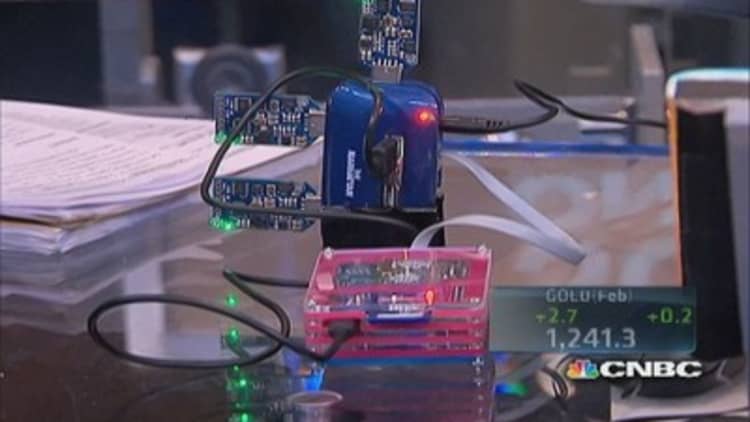Bitcoin's resiliency—as well as its recent rise above the $1,000 mark—is gaining it additional converts to the belief that the cryptocurrency is for real.
One of the latest skeptics-turned-believers is Ty Danco, a respected market veteran who has worked up one side of Wall Street and down the other. Danco once oversaw more than $60 billion of assets and now is the CEO at a trading firm called BuysideFX.
In an essay for the subscription-only Tabb Forum, he outlines what he sees as the future for bitcoin, the digital currency that last was trading at one unit equaling more than $900.
"The media thoroughly covered its meteoric rise in market value as a currency, but the bigger story is that high-profile investors have placed significant bets on Bitcoin-related businesses this year, including Li-Ka Shing, Union Square Ventures, and Andreessen-Horowitz," Danco wrote. "Given their involvement, bitcoin demands a serious look."

(Read more: Do you really know bitcoin? Here are 11 myths)
While acceptance for bitcoin continues to grow—gaming website Zynga this week said it would accept bitcoins for payment—Danco said it faces four challenges before gaining Wall Street's acceptance:
1. Clear regulation
It seems bitcoin's path to legitimacy runs straight through government and regulatory agencies, quite likely the Commodity Futures Trading Commission. Says Danco:
Early signs from regulators are more promising than I initially expected, but we still have a long way to go. CFTC: Bitcoin most likely falls in your lap, whether as a commodity, currency, or derivative. Take a stand!
2. A) More adult supervision, and B) Big endorsements.
Bitcoin indeed needs to shed its image as a toy created by hobbyists and nerds. After all the leading bitcoin exchange is Mt.Gox, which is not an abbreviation for "Mount Gox" but rather an acronym for Magic The Game: Online Exchange, where folks used to trade cards for a Dungeons & Dragons-esque game.
I can't see Prudential Insurance, Vanguard or the Monetary Authority of Singapore trusting their assets with these kids. Those of you running Bitcoin exchanges, dump the rhetoric, go hire some pros from SWIFT, the major credit card companies, central banks, the FSA, etc.
On 2B, bitcoin already has gotten some pretty weighty endorsements—hedge fund titan Michael Novogratz, for instance—but could use a little more heft, Danco said.
(Read more: Bitcoin endorsed by top hedge fund manager)
To get broad buy-in of its legitimacy, Bitcoin needs some sponsorship by big players. Some well-known VCs have jumped in, but we need one or two mammoth banks like JPMorgan or Deutsche Bank to come onboard; not shady entities based out of the Caymans
3. Establishing two-way transactions and delivery vs. payment (DVP).
DVP is another byway on the way to legitimacy. It ensures that users of bitcoin aren't going to get ripped off on the other end as it requires payment at the time of delivery for the goods in question.
When a DVP and security registration can be automated via a decentralized P2P process, Bitcoin takes the banking world by storm.
4. A clearer identity.
Danco explains:
Finally, to become institutional, Bitcoin requires optional and verifiable identity opt-ins. Identity for securities settlement instructions is going to be known in advance before diving into anonymous-looking alphanumeric strings of private and public keys. (An exception may be made for dark pool transactions.) My guess is that institutional "wallets" (read: custody accounts for bitcoin) may have some identifiable and consistent beginning, then unique and cryptographic back ends.
While achieving the four steps will be difficult, it also is very doable, rendering bitcoin skeptics increasingly into the shadows.
It's hard to go against 30 years of habit, but this old dog has converted from Krugmanesque bitcoin hating to being optimistic about virtual currencies. It will be time for new tricks soon, but bitcoin needs to check a few boxes before it's ready for primetime.
—By CNBC's Jeff Cox. Follow him on Twitter @JeffCoxCNBCcom.






